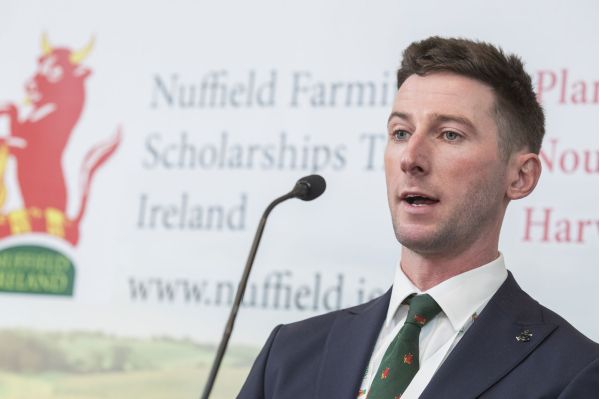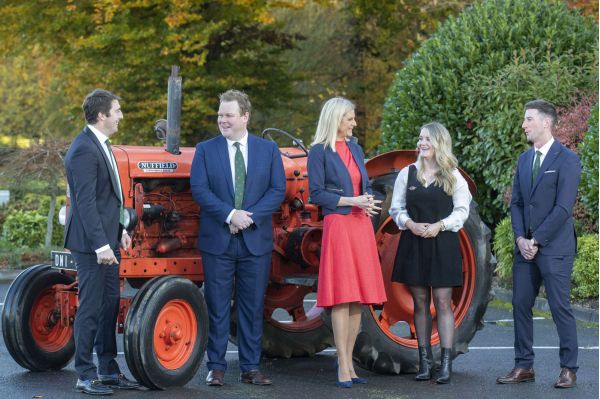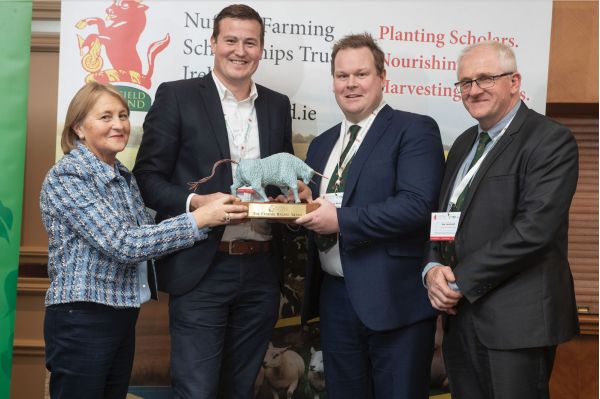The road to net zero

David had a breadth of experience before he undertook his Nuffield studies. He has worked on farms in Ireland and New Zealand, has been involved in discussion groups, and achieved a Bachelor of Science at the University of Limerick. Currently producing milk on the family’s dairy farm near Claremorris, he is well placed to conduct this important research.
Achieving net zero carbon emissions by 2050 includes an intermediate target of achieving a 25 per cent reduction within the next seven years. This puts farmers and food processors under enormous pressure to achieve reductions while remaining financially viable, David said.
Zero emissions and net zero emissions are two distinctly different references, David explained. The latter refers to striking a balance between greenhouse gas emissions produced and those removed, by sequestration, for example. And in his presentation, David insisted that the agricultural industry is uniquely placed to achieve this balance because soils are some of the best available means of securely sequestering carbon into the ground and locking it away in a stable form.
A practical target?
“My aim was to evaluate the extent to which net zero emissions is practically achievable on a commercial farm,” said Donal. “To that end, I wanted to identify the key challenges and opportunities that net zero represents for farmers and to consider if and how the farmer-owned co-operative structure of our dairy industry can be utilised in achieving net zero.”
David made a key differentiation in comparing what is achievable in today’s policy environment and carbon-accounting mechanism versus what could be possible in an ideal world. He carried out his study through an extensive interview process, with farm visits, attendance at conferences, use of remote media such as Zoom, meetings as well as essential travel, afforded by the Nuffield Scholarship bursary, across Ireland, the UK, Costa Rica, Italy, New Zealand, Brazil, the US, Canada and Belgium. That list of countries alone, gives some indication of the time, effort and commitment involved in completing David’s thesis.
Full carbon accounting required
There are vested interests using the term net zero carbon as a marketing tool, and there is an element of greenwashing going on, said David. This is highlighted, he said, by the fact that there is any number of examples of organisations claiming net zero certification. He does concede, based on his investigations, that many of these organisations are on the road to net zero, insofar as they are reducing emissions, but he found little evidence to support a contention that there is a viable plan to achieve the end goal fully. He added: “An organisation can be purchasing carbon credits through an accreditation scheme to achieve net zero, with limited oversight on the organisation issuing the credits. That’s why there is a need for caution among consumers in making informed choices when assessing claims of net zero,” he advised.
Such claims, he said, must be backed up by transparency, accountability, and credible certifications. In an Irish farming context, these claims must be backed up by robust frameworks that include life cycle analysis of all farm inputs.
David insisted that detailed studies of changes in soil organic matter at depth are among the research still to be completed. He commented that Irish agriculture needs to settle on a direction of travel. In addition, there is increased investment required in our national inventory data, with a national carbon baselining programme to be put in place. Finally, the Nuffield scholar pointed to the need for a ‘carbon in-setting’ bank to be established.
Min-till
One particularly insightful comment came from former Nuffield scholar and international food producer, Jim McCarthy, who attended the conference. Jim questioned the continuing practice of ploughing as part of arable farming, stating that it is one of the most obvious sources of carbon release from soils. He has long been a firm advocate of min-till and other minimal tillage practices to establish crops, not only in Ireland but across the globe, in the various countries in which he has farmed.

Nuffield scholars Pat Collins, Lance Woods, Aoife Feeney and David Dolan with Minister of State for Land Use and Biodiversity in the Department of Agriculture, Food and the Marine, Pippa Hackett (centre) at the 2022 Nuffield Ireland annual conference.
Mixed farming options
Another Nuffield scholar, Pat Collins, reported on the benefits of integrating dairy beef and crop production. His aims were to highlight a more environmentally and economically sustainable farming option, as well as better use of fixed assets and the reduction of income and price volatility. The summary of Pat’s conclusions is clear: “Grassland for grazing should replace cropping on some ground, while crops can, in suitable circumstances, replace grass for forage and sale. There are benefits from crops grown after cereals being used as low-cost animal feed and the use of extra labour can be justified to help with the additional workload when it is better spread across the year.”
Prioritising water quality
Aoife Feeney presented her findings on identifying ways to encourage farmers to prioritise on-farm action for water quality, and she advocated for a widespread buy-in by farmers: “Ten farmers taking one action is better than one farmer taking ten actions,” she said. “The expansion of existing programmes and continued public-private collaboration will be crucial to achieving action for water quality at farm level. Farmers taking ownership and leading change in their communities will drive positive outcomes for water quality.”
Laying out specific requirements, Aoife said: “The Agricultural Catchments Programme and Agricultural Sustainability Support and Advisory Programme (ASSAP) must be expanded. Funding mechanisms to support extension and education services for farmers must be put in place, with an increased focus on water quality and biodiversity by knowledge transfer groups established at catchment scale. A reduction in blame culture can be brought about through joint catchment projects involving farmers and local communities, encouraging the uptake of actions on both sides.”

Ella Walshe, Pat Walshe and Nuffield Ireland chair, Joe Leonard (far right) present Nuffield Ireland scholar, Lance Woods, with the inaugural Nuffield Ireland Padraig Walshe award. This award will be given annually to the best presentation by a returning scholar, as voted on by the conference attendees.
Inaugural Padraig Walshe Award
Lance Woods won the inaugural Padraig Walshe Award for his Nuffield thesis on the potential for positive impacts of animal health on meeting climate change targets. Lance’s conclusions were direct and precise: “We need to embrace the tools. An increased uptake of existing animal health and husbandry technologies and practices can reduce emissions by between 18 per cent and 30 per cent. Education and awareness at farm level are critical to success.”
Lance also pointed to the potential of agricultural technologies in the drive for lower emissions and highlighted the need to raise adoption rates and manage obstacles to more widespread adoption. More use of vaccines, he added, should be incentivised, alongside further research to identify further means of improving animal health through the development of additional preventative measures.





